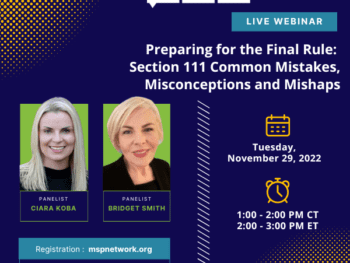
Rita Wilson, CEO, Tower MSA Partners
… on using evidence based medicine in the MSA review process
While CMS includes evidenced based medicine in its MSA evaluation resources, it does not require treatment to line up with science in order to be approved and allocated. Consequently, many MSAs allocate for inappropriate medical procedures and pharmacy regimens that threaten patient safety.
Claims should be staged to identify treatment issues and cost drivers prior to preparing an MSA. A proper pre-MSA Triage compares six months of medical records to clinical guidelines and this process frequently identifies recommended procedures or surgeries that have not occurred – and may never be needed. To avoid funding procedures that will never take place, the next step is to contact treating physicians to clarify recommendations and make sure the medical records reflect ensuing changes.
Triage should also detect inappropriate pharmacy regimens that pose risks to patient safety and drive up settlement costs. Often, injured employees are taking opioids, benzodiazepines and other drugs deemed inappropriate for their conditions by evidence-based guidelines. Off-label use of certain drugs, like Lyrica, is another issue because Medicare will not pay for off-label use of certain drugs. Sometimes there are prescriptions that have never been filled. If not addressed, CMS will require their costs to be allocated in the MSA. A best practice MSA provider will work with treating physicians to discontinue inappropriate medications, monitor tapering and secure the documentation CMS requires to allocate for the updated pharmacy program.
Applying EBM to claims is an extra step in the settlement, but well worth the time. It protects patient safety by making sure treatment is sound and reduces costs by removing drugs and procedures that fall outside science. It’s the right thing for the patient and the payer.
Click Link to Access Free PDF Download
“8 ‘Think Outside the Box’ Tactics to Settle Workers’ Comp Claims”
Using Evidence Based Medicine In The MSA Review Process
The concept of future medicals and Medicare Secondary Payer compliance is a challenging component of any workers’ compensation claim management team seeking to reduce costs in an ethical manner. The voluntary Medicare Set-aside review process established by the Centers for Medicare and Medicaid Services (CMS) compounds this problem. Use of Evidence Based Medicine (EBM) is one method that concerned parties can use to challenge CMS polices and provide a consistent result that meets the needs of workers’ compensation programs.
Understanding the Voluntary MSA Review Process
CMS started to provide guidance to parties regarding the workers’ compensation Medicare Set-aside review process in 2001. This took the form of policy memoranda that was sometimes contradictory and confusing. In an effort to streamline the process and make it more understandable, CMS changed course and consolidated this information into the Workers’ Compensation Medicare Set-Aside Arrangement (WCMSA) Reference Guide.
CMS will review a proposed WCMSA amount when the following workload review thresholds are met:
- The claimant is a Medicare beneficiary and the total settlement amount is greater than $25,000.00; or
- The claimant has a reasonable expectation of Medicare enrollment within 30 months of the settlement date and the anticipated total settlement amount for future medical expenses and disability/lost wages over the life or duration of the settlement agreement is expected to be greater than $250,000.00.
Consistent with federal regulation interpreting the Medicare Secondary Payer Act, CMS cautions parties that they must still consider Medicare’s interests even if a settlement does not meet the specified voluntary workload review thresholds.
Understanding CMS Policy Concerning Future Medicals
CMS does consider every workers’ compensation case in a proverbial vacuum. For instance, “counter-highers” concerning the MSA allocation often arise in the following situations that most interested stakeholders consider unreasonable:
- Degenerative changes that naturally occur resulting in prolonged medical care and treatment for a work injury that arguably only aggravates, but does not accelerate the an underlying condition. This prolonged care CMS seeks reimbursement for is often the result of the natural aging processes or prior non-work related injuries that sometimes require surgical intervention and costly prescription drug use;
- The ongoing and sometimes excessive use of prescription pain medications. This is especially the case when it comes to opioid-based prescription medications, which significantly spike the cost of workers’ compensation claims. These prescription medications can only be effective when used for acute pain relief and not long-term maintenance care; and
- Issues raised in independent medical examination reports regarding the reasonableness and necessity of future medical care and treatment. Although these reports are prepared at the request of the employer/insurer, doctors performing these examinations have adequate foundation for issuing their expert opinions within a reasonable degree of medical certainty in a legal or administrative hearing. CMS policy does not recognize the validity of these reports in the WCMSA review/approval process.
Using Evidence Based Medicine to Counter CMS Objections
EBM is a recognized approach within the practice of medicine that seeks to optimize the results in patient care via medical evidence based on research and design. In the case of questions concerning the use of opioid-based prescription medications, this process is used to demonstrate the effectiveness of a certain treatment regimen and denote when the continued use losses it benefits.
Using EBM to stage the claim for submission and approval by CMS in the Medicare set-aside process does require work, but the payoff is significant. The process includes utilization of medical records, scientifically supported medical research and an evaluation of trends to demonstrate the best course of future action for an injured worker in an effort to modify treatment. It also includes a review of possible treatment modalities that discourage prescription drug abuse and deliver savings the interested stakeholders and an acceptable level of care to the injured party. The use of medical experts to challenge inappropriate treatment, and the process of maintaining oversight over the claim until the CMS accepted evidence is obtained to demonstrate drug regimen can be time consuming, but the result is long-term savings and a CMS approved MSA that concurs with EBM guidance.
Conclusions
The challenges of the workers’ compensation system require members of the claim management team to be proactive. One area includes the use of EBM to challenge CMS orthodoxy when it comes to costly future medical projections, which often include excessive use of dangerous opioid-based prescription drugs. While costly, the use of EBM can reduce the threat posed by legacy claims.
Author Michael Stack, Principal, COMPClub, Amaxx LLC. He is an expert in workers compensation cost containment systems and helps employers reduce their work comp costs by 20% to 50%. He works as a consultant to large and mid-market clients, is co-author of Your Ultimate Guide To Mastering Workers Comp Costs, a comprehensive step-by-step manual of cost containment strategies based on hands-on field experience, and is founder of COMPClub, an exclusive member training program on workers compensation cost containment best practices. Through these platforms he is in the trenches on a working together with clients to implement and define best practices, which allows him to continuously be at the forefront of innovation and thought leadership in workers’ compensation cost containment. Contact: mstack@reduceyourworkerscomp.com.
©2016 Amaxx LLC. All rights reserved under International Copyright Law.
Do not use this information without independent verification. All state laws vary. You should consult with your insurance broker, attorney, or qualified professional.












